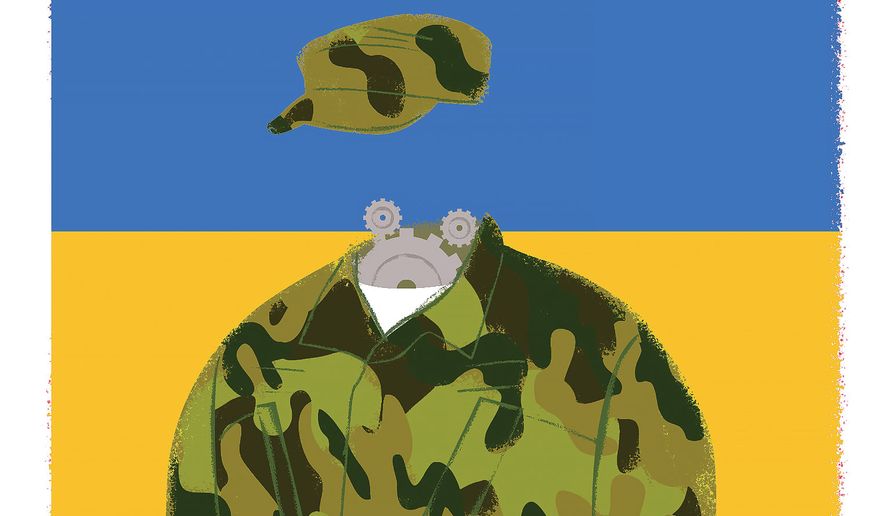OPINION:
“The fight is here. I need ammunition, not a ride.”
Ukrainian President Volodymyr Zelenskyy reportedly spoke these prophetic words as he rejected a U.S. offer to abandon Kyiv immediately after Russia launched its barbaric invasion of Ukraine nearly three months ago.
And now we know why the U.S. made the offer. The Biden administration expected Russia to defeat Ukraine quickly, leaving only the option of supporting an insurgency composed of whatever was left of Ukraine’s battered military forces.
U.S. intelligence agencies accurately predicted the Kremlin’s plans to invade but — as Maine Sen. Angus King, an independent, recently pointed out that Washington also wrongly forecast Kyiv would fall in a few days. Brave Ukrainian forces, which heroically carry on the fight to this day, repelled Russia’s attempts to topple the Zelenskyy government and install a puppet government in the Ukrainian capital.
By March, Defense Intelligence Agency Director Lt. Gen. Scott Berrier admitted to the Senate Intelligence Committee that the intelligence community had badly misjudged Ukraine’s will and capacity to fight. Director of National Intelligence Avril Haines testified that Russian President Vladimir Putin had also underestimated Ukraine’s resistance and acknowledged that U.S. intelligence agencies could have done a better job of analyzing the challenges Mr. Putin “encountered with his own military.”
Lt. Gen. Berrier told the Senate Armed Services Committee this month that the U.S. intelligence as a group had failed to recognize Russia’s own military shortcomings, including a “hollow force, lack of NCO corps, lack of leadership training [and] lack of effective doctrine.”
Had Mr. Zelenskyy accepted the evacuation offer, the U.S. would have committed a significant intelligence failure, with horrific ramifications for European — and by extension American — national security. President Biden and his fellow NATO leaders have Mr. Zelenskyy and his courageous comrades to thank for their steadfast defense of their sovereign territory, as well as the blow they have struck for the universal values of liberty and democracy.
The CIA is principally responsible for “human intelligence” (HUMINT) — the art of recruiting and managing spies and stealing secrets, the cornerstone of the all-source analysis on which policymakers rely. The notion of an intelligence success or failure presupposes there are facts and assessments that can accurately predict the likely course of events. Presumably, the intelligence community should have been able to collect detailed intelligence on Ukraine’s military capacity, given the significant increase in joint training with NATO members after Russia invaded Donbas and illegally annexed Crimea in 2014.
But the intelligence community never had the opportunity to track Ukraine’s or Russia’s military in action until Russia fired the first shots. Intelligence analysis always involves an element of uncertainty, which is why intelligence gathering and analysis are so dynamic.
That’s why the intelligence community’s assessments of the Russian and Ukrainian militaries are far different today compared to three months ago. Russia’s relatively sound performance in much smaller-scale conflicts, including the 2008 war against Georgia and the intervention on behalf of Bashar al Assad in Syria’s civil war, might have contributed to analysts’ exaggerated assessment of Moscow’s military capabilities.
Intelligence-gathering and analysis are neither linear nor certain. Assessing the Kremlin’s plans, intentions and capabilities is like assembling a massive jigsaw puzzle, only with some pieces missing, some damaged and some from other, as-yet unassembled puzzles. And because of its sophisticated counterintelligence capabilities, Russia is an exceptionally hard collection target.
Earlier this month at a Financial Times forum, CIA Director William Burns said Russia’s military struggles in Ukraine had “unsettled” China, but would not alter Beijing’s plans to conquer Taiwan. “Clearly the Chinese leadership is trying to look carefully at what lessons they should draw from Ukraine about their own ambitions in Taiwan,” he said.
The U.S. intelligence community should likewise seek to draw new lessons learned starting with gathering a “Red Team” which could examine what was known and what was not prior to Russia’s invasion. Key will be the intelligence which was either unverified or later proven false, as well as the tradecraft on which the analysts relied to do their work and the veracity of sources from whom HUMINT was obtained.
Intelligence is a key tool in the president’s arsenal to ensure his executive decisions best serve our national security interests. With China brazenly threatening Taiwan’s independence while stealing our intellectual property and menacingly expanding its military base, there is no time like the present to ensure our intelligence community does all that is possible to refine and improve its work product.
• Daniel N. Hoffman is a retired clandestine services officer and former chief of station with the Central Intelligence Agency. His combined 30 years of government service included high-level overseas and domestic positions at the CIA. He has been a Fox News contributor since May 2018. Follow him on Twitter @DanielHoffmanDC.




Please read our comment policy before commenting.